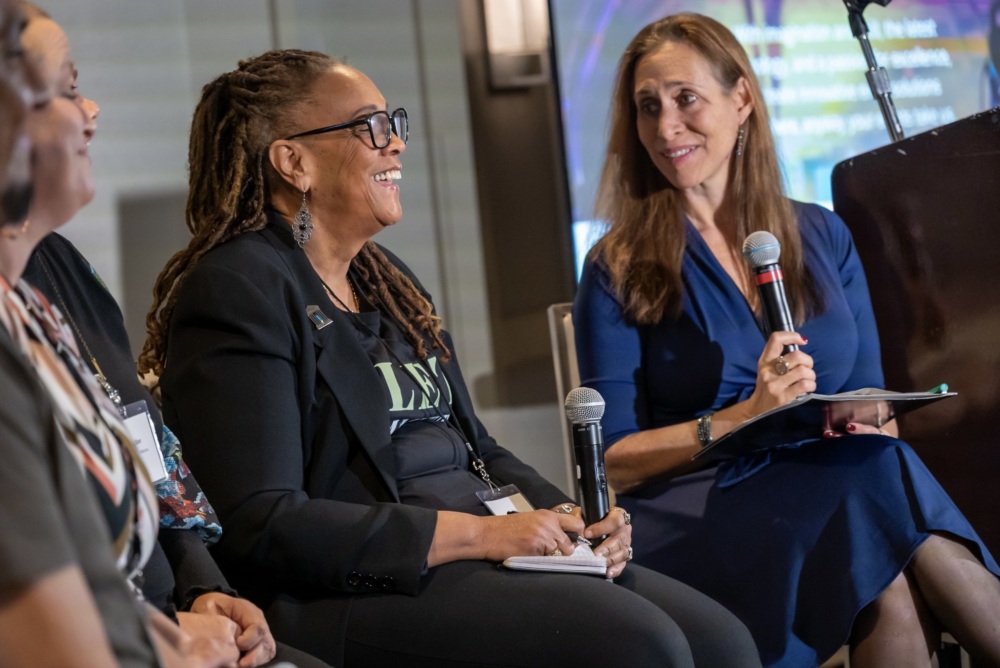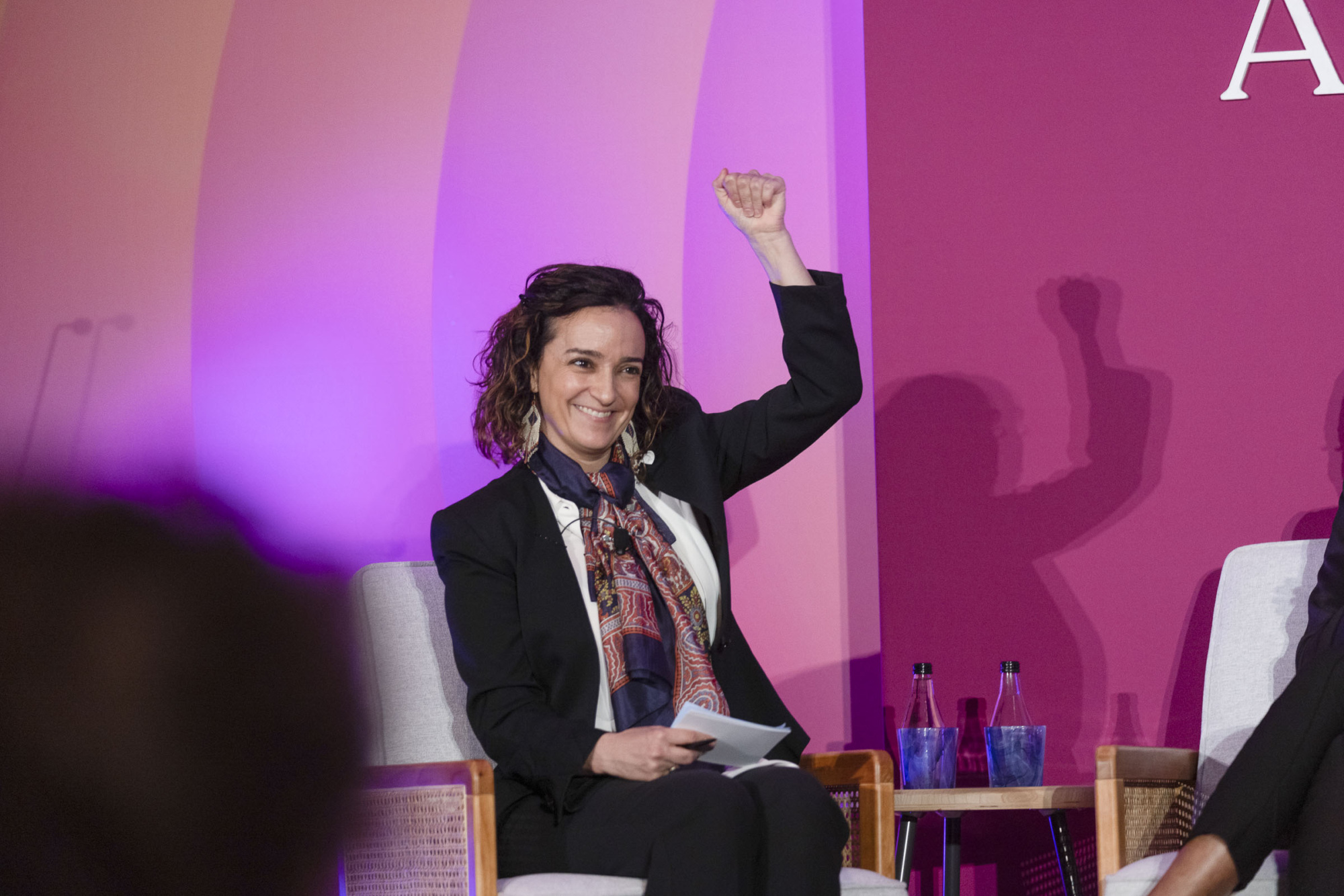I didn’t grow up in a family with money to give away, and neither did my husband, Rich. My dad was born in Israel to Russian Jewish refugees who fled anti-semitism and Stalin after World War 2. He moved to Brazil when he was five, and his family finally got to the United States when he was ten. My mother-in-law came from Ecuador. Our parents’ and their parents’ lives were affected by not just war, but also food, housing and job insecurity, physical and sexual abuse, drug addiction, and multiple types of discrimination. Our families’ resilience enabled us to have opportunities our parents never had, and Rich and I were from a young age driven academically and then professionally to make our families’ struggles worthwhile. Now, almost all of our philanthropy has a social justice bent. We yearn for a more just America and world. Thus far, this has led us to give with a focus on equality for girls and women, people of color, the LGBTQ community, disabled veterans who enlisted in the first place because they didn’t have many other good choices, and immigrants and refugees, along with supporting need-based financial aid for education and organizations whose missions involve making the arts accessible for and reflective of all.
I initially conceptualized my Women Moving Millions pledge as a way to counteract the long-time inequities in the distribution of resources across gender identities (financial but also other kinds of capital). Thanks to WMM programs, though, I now fully understand that we *all* need a gender equal world. At a macro level, our sustainability as a human species depends on it. Even at an individual level, so many of us – even those of us with much privilege – are suffering in needless ways. With no disrespect to any of the many truly wonderful human beings that share one or more of these identifiers, as a system, the white Christian patriarchy isn’t working.
While more gender diversity in the existing structures of power will always be a good thing, I am now convinced that real systemic change is likelier to come from growing alternate organizations and structures rather than trying to transform the older ones from within. Both my field of organizational behavior’s empirical literature about organizational-level culture change, along with the history of women’s movements that Chris Grumm and others provided at the Philanthropic Leadership Program, support this hypothesis. And so, I am now shifting more of our investments (both philanthropic and traditional) from the big, “safe” entities built solidly within the patriarchy to smaller organizations that are more proximate to the problems and people served and freer to run themselves differently (i.e., prioritizing effectiveness and sustainability, rather than shorter-term “efficiency”). With respect to my gender-focused philanthropy, this means investing in grassroots feminist organizations more than women’s and girls’ initiatives at larger, broader non-profits. As just one example, one of the biggest philanthropic investments I made last year was in the super innovative new Equality Fund co-founded by Jessica Houssian. The Equality Fund is building a long-term and self-sustaining source of funding and capacity building for grassroots feminist organizations and women’s movements globally.
In sharing my newly refined theory of change, I must also note that it wasn’t just WMM-explicit content and my professional base of knowledge that helped me get there. Perhaps what has influenced me most of all in my short tenure as a WMM member is the way in which WMM programming has shown, rather than just told, me what is possible. As a former Management business school professor and also in my role as a parent, I have always tried to remember that kids and adults alike tend to learn so much more from what we do (and have them do themselves) compared to what we say. WMM leadership, speakers, and faculty have modeled and engaged me in new collaborative experiences that have enabled me to feel what this different system built upon a foundation of gender balance could be like. We really can be “linked, not ranked”, as Gloria Steinem sums it up so elegantly. We can take the time to breathe together through conflict and obstacles, to deeply listen to and learn from one another, to let each other bring our whole true selves into a space, to spread voice rather than enforce silence, to build trust through difficult, sensitive conversations, and to kick some *ss together getting really important sh*t done while doing all of the above.
There is so much more that I’m now exploring thanks to being activated by WMM programs and new friends. I broke up with one of our big banks, moving to a B Corp CDFI Spring Bank. Despite being married to a professional investor, I have now stepped into my own power to drive more of our traditional investments to be used as a force of good and change (for example, via Kristin Hull’s Nia Impact Capital‘s Global Solutions Portfolio). I am exploring the power of the arts to change hearts and minds (i.e., I donated to Disclosure: Trans Lives On Screen, And She Could Be Next, and Through the Night after GoodPitch USA). I used what I learned at the Leadership Program’s public narrative workshop to pitch an event hosted by a female founder of a political organization called Forward Majority that is doing critical work toward achieving gender equality in the U.S. through flipping state legislatures. I’m showing up to more political fundraisers broadly, to raise issues that are still too uncommonly voiced in these spaces. I hosted two powerful Empowerment Self-Defense workshops at my kids’ school featuring Yudit Sidikman and one of her ESD Global board members. I’m investing in Holly Fogle’s wonderful Nido de Esperanza, supporting the growth of mamas and babies ages 0-3 living at or below the federal poverty line. I also continue to spend a lot of time helping new asylum-seeking parents and their children affected by current ICE policies through Action Potluck/Sanctuary Neighborhoods. Equally importantly, I’m also trying to raise my son and daughter to be the change I want to see in the world, and that is requiring me to do more personal work to heal myself so I can model it better. My WMM experiences (especially at the Leadership Program) have catalyzed my commitment to that last part, too.
The power of the WMM community for me has been tremendous. One October morning at the Edith Macy Center, we walked in to see a Brené Brown quote that I cannot get out of my head: “You either walk inside your story and own it, or you stand outside your story and hustle for your worthiness.” A big piece of my work right now is about “walking inside my story, owning it” and being more free about sharing with others – about my past, my present, and my vision of the future. I have been shown through the examples of other WMM members how much of a gift authenticity can be for others, and how vulnerability can be a portal for immense strength. I am especially grateful for my Leadership Program cohort sisters who I will cherish and rely on as well as support in any way I can, always. I am now because we are. And, we are only going to get this gender equality thing done in community. Per the 2020 Summit focus, it really will take the power of US.
Rachael Wells, In Memoriam

